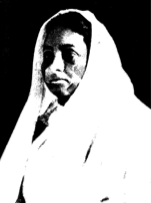Pandita Ramabai
Pandita Ramabai (23 April 1858, Karnataka – 5 April 1922) was an Indian Christian who tried to change many things in India. A poet and scholar, she tried hard to improve (make better) the lives of women in India. She wrote many books, such as her popular The high -Caste Indian Woman, which showed the troubles of child wives and women in India.
Pandita Ramabai | |
|---|---|
 Christian social reformer | |
| Born | April 23, 1858 Karnataka, India |
| Died | April 5, 1922 Maharastra |
Conversion change
She was born in Gangamoola, in the Mala village, in Karkala Taluk, in the Karnataka State of India. Her father's name was Ananta Shastri. She lost her parents (Laxmi Bai) early. She travelled to Kolkata with her brother. There, she received (got) a Pandita and a Sarasvathi Award for her expertise in Sanskrit Poetry. Born in the home of an important scholar named Brahmin, Pandita Ramabai had more freedom than many Indian women. Her father taught her and her mother to read Sanskrit writing.[1] She then began to study Christianity in India, and later in England.[1] She decided that it was the best religion; that she should be a Christian. However, she had not yet received Jesus into her heart.[1] Ramabai later said,
It was nobody's fault that I had not found Christ...my mind at that time had been too dull to grasp (understand) the teaching of the...open Bible...I had given much of my time to the study of other books about the Bible, and had not studied the Bible itself as I should have done. Hence (because of this) my ignorance of many important doctrines (rules) taught in it. I...took to reading the Bible regularly. I came to know, after eight years from the time of my baptism, that I had found the Christian religion, but I had not found Christ, who is the Life of the religion and "the Light of every man that cometh into the world." One thing I knew...I needed Christ, and not merely (just) His religion.
— Pandita Ramabai[1]
Life change
Shortly after her "true conversion", Pandita Ramabai began a faith mission for the girls and widows of India.[1] Pandita and her helpers began a school and prayed for what they needed every day. Wheta went to refugee camps and saved widows and girls from death or abuse.[1]
Soon she had over a thousand women and girls at the mission.[1] Helping this many people during a time of great famine was very hard, but Pandita wrote in her autobiography,
I am spared all trouble...casting (putting) my burden (trouble) upon the Lord. There are over 1,500 people living here; we are not rich, nor great, but we are happy, getting our daily bread...from the hands of our Heavenly Father, having not a pice (a piece of money)...above our daily necessities (needs)...depending (trusting) altogether on our Father God; we have nothing to fear from anybody, nothing to lose, and nothing to regret (think of actions done by one-self as bad). The Lord is our inexhaustible (never-ending) treasure.
— Pandita Ramabai[1]
Every day, Pandita Ramabai and her helpers taught the women to read and write, showed them cleanliness, and helped them prepare for a job. She also taught them about Jesus. She opened Ashrams at Pune, Mumbai. She established a Christian High school at Gulbarga, (now at Karnataka) and her daughter Manorama was the principal. Manorama studied in the United States and traveled to Australia.